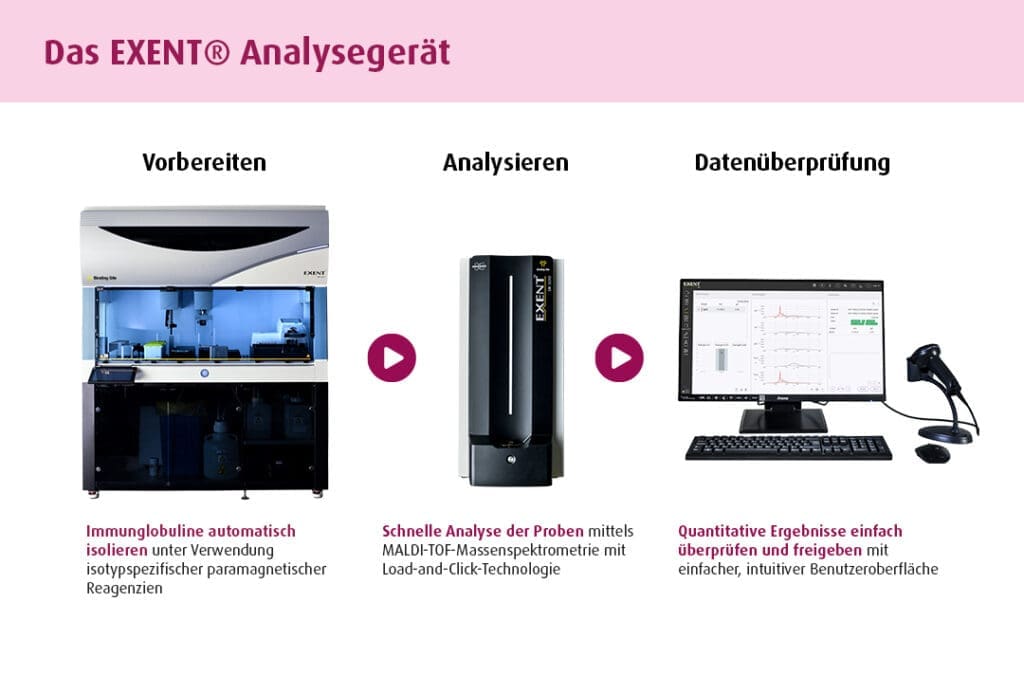Mass spectrometry sets new standards in myeloma diagnostics
Mass spectrometry (MS) is a highly sensitive and specific method for the diagnosis of multiple myeloma (MM) that can effectively complement established standard methods such as serum protein electrophoresis (SPE) and immunofixation electrophoresis (IFE). In the context of new treatment options, MS analysis can significantly improve disease monitoring and therapy management in MM. Especially in the detection of minimal residual disease (MRD), MS could play a central role in the longitudinal monitoring of myeloma patients in the future.
Multiple myeloma: Clinical background
MM is a malignant plasma cell disorder characterized by clonal proliferation of plasma cells in the bone marrow (BM). These abnormal plasma cells produce monoclonal complete immunoglobulins or free light chains, known as M-proteins or paraproteins, which are detectable in serum and urine. The clinical symptoms are often non-specific and range from asymptomatic incidentally diagnosed disease to acute courses with hematopoietic insufficiency, renal insufficiency, hypercalcemia or pronounced osteodestruction.
Current diagnostic standards and their limitations
Thanks to innovative therapeutic approaches, many MM patients now achieve permanent remissions. However, this places increased demands on the precise assessment of MRD. The standard methods SPE and IFE, which are used to identify and quantify M proteins in serum, have reached their limits. Their sensitivity and specificity are particularly limited in patients with a low disease burden, such as after BM transplantation or in strict complete remission. Highly sensitive technologies such as Next Generation Sequencing (NGS) and Next Generation Flow (NGF) are used in clinical research to accurately diagnose MRD. However, their use for close monitoring of progression is limited by the need for invasive sampling, the heterogeneous distribution of myeloma cells in the BM and the presence of extramedullary disease foci.
Due to these limitations, the additional use of highly sensitive, blood-based monitoring such as MS for monitoring MM patients appears to be sensible and necessary.
Mass spectrometry: advantages for diagnostics
Due to its high sensitivity, MS-based myeloma diagnostics offers a methodologically superior alternative to conventional standard procedures, especially for the assessment of MRD. It enables more precise detection and quantification of M-proteins, which enables more accurate disease monitoring even with a low disease burden. Especially in IFE-negative patients, MS analysis offers high diagnostic added value when used sequentially to SPE and IFE.
MS is characterized by its high specificity, which enables reliable differentiation from interference by therapeutic antibodies such as daratumumab, elotuzumab or isatuximab. While IFE misinterprets these antibodies as monoclonal proteins, MS allows precise differentiation. Furthermore, it enables the differentiation of bi- or oligoclonal patterns, which is particularly relevant for patients after BM transplantation, when a differentiation must be made between a relapse and an excessive immune reconstitution. In addition, MS can identify specific structural modifications of the M proteins that provide information on the individual disease profile. One example of this is the detection of N-glycosylations on light chains, which are considered a risk factor for the progression of monoclonal gammopathy of undetermined significance (MGUS).
The integration of MS into the clinical diagnosis of MM opens up new possibilities for personalized therapy management and precise follow-up. The International Myeloma Working Group (IMWG) has therefore published consensus recommendations for the use of MS-based diagnostics in blood samples. The use of matrix-assisted laser desorption/ionization time-of-flight MS (MALDI-TOF-MS) as an alternative to IFE for the detection of M-proteins, for the differentiation of therapeutic monoclonal antibodies and for the precise assessment and interpretation of therapy response in clinical studies is particularly advocated.
For further information on MS, please do not hesitate to contact us. Please contact us: proteine@limbachgruppe.com

The respective companies are responsible for the content of the “Corporate News” section.




